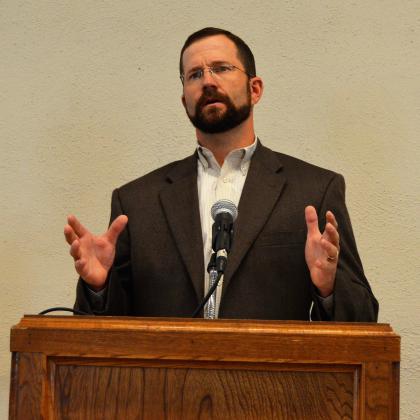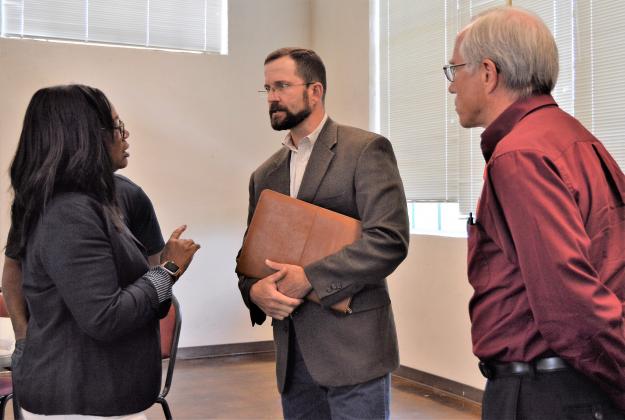Leman kicks off District 13 legislative update tour
State Representative Ben Leman kicked off his District 13 Legislative Update “tour” in his home county of Grimes Monday, July 1, with breakfast at the Roans Prairie Community Center and lunch at the Navasota Center. The events were hosted by the Navasota Grimes Chamber of Commerce and sponsored by Glenn Fuqua, Inc. and Omaha Ranch. From Grimes, Le-man will spend the next two months holding legislative updates in 25 communities in the seven-county district he represents.
Of like mind
Leman began his update saying, the 86th Legislative session had a different “feel” from past sessions because Governor Gregg Abbott, Lieutenant Governor Dan Patrick and Speaker of the House Dennis Bonnen were “on the same page.”
He said, “They were very much on the same page on addressing school finance reform, property tax reform, and trying to do it in a fiscally responsible way. All of those three issues are tied together very closely. You can’t have school finance reform without having property tax reform.”
Leman said, “House Bill 1 is the budget bill and stayed under all four Constitution spending limits which makes it a fiscally responsible budget.”
He continued, “House Bill 3 was a historical transformation in how we fund public education and how we want to approach it as a state. It provided over $5 billion in property tax relief.”
According to Leman, the State of Texas will buy down or compress the property tax rate at the school level, reducing it on average 8 cents this year and 12 cents next year.
House Bill 2, which Le-man said works together with HB 3, is property tax reform and changed the rollback rate from 8% to 2.5% to limit the local school district from being able to raise it back up through a property tax increase.
He said, “It forces the state to fund public education moving forward.”
According to Leman, the state previously funded 50%. It’s currently at 38% and HB 2 will move funding up to 45% and eventually back to 50%.
Leman said that the state’s basic allotment per student will increase from $51.40 to $61.60. He added that schools will be allowed to keep more of their money with the dissolution of “Robin Hood.”
As for how small cities with smaller budgets will be affected by the rollback rate, Leman said, “Up to $500,000 revenue, it will stay at 8%, meaning any local governmental entity can continue to raise your property taxes up to 8% as long as the total amount of revenue collected is under $500,000. Above that, then the rollback rate goes down to 3.5% and that local government entity would have to sell the idea of raising taxes beyond that amount to citizens and make sure that citizens are on board with that property tax increase.”
Other gains
Other areas of education addressed by the legislature included the struggling Teachers Retirement System, safe schools and the Staar Test. Retired teachers will receive a 13th check to allow for inflation, $200 million has been earmarked to fund improvements to school safety and Staar Tests have been reduced and allowed to be spread out over time.
Sex-trafficking was also tackled by the legislature by addressing the backlog of processing rape kits, enhancing penalties for online sex trafficking and sexual assault and doubling the time of the statute of limitations for a child victim of a sex crime.
New legislation addressed emergency preparedness, illegal immigration and constitutional liberties such as discriminating against businesses based on their religious beliefs and free speech on college campuses.
Leman said, “There has been a movement referred to as “doxing” and there have been aggressive tactics from the student population or individuals outside coming in, and bullying kids who might be standing up and voicing their beliefs about given topics. Doxing is where they target these kids…and try to personally disrupt their lives to discourage them from voicing their opinions.”
Sponsored bills passed
Praising his staff, Leman said that it’s a team effort to get legislation passed but also requires a consensus within the legislature.
He said, “It takes 76 out of 150 and for any bill to gain legs. You really have to do a lot to facilitate support and get a team of support that is helping you get that agenda forward.”
Leman introduced 20 bills and 10 passed. They include the Anti-Spoofing Bill, calling from a stolen or fake number, the Valedictorian Bill allowing valedictorians from classes of less than 10 be accepted for automatic college admission and adjusting the competitive bidding process limit for road and bridge departments from $25,000 to $50,000. Others include child residential facilities to have an education plan in place before opening, the addition of another judge on the Juvenile Board, and the Admonition Bill that requires written and verbal acknowledgement by illegal aliens during the plea bargain process that they have received notification that they could be deported because of their crime.
Necessity of so many
bills
During a wrap-up and Q&A period, Leman acknowledged that they weren’t able to pass every bill of concern, particularly referring to those related to eminent domain and high-speed rail.
He recapped some of the issues faced by landowners, legislation in higher courts that ruled against Texas Central, their lack of public disclosure of recent rulings as well as legislation in previous sessions denying use of taxpayer funds.
Leman said, “It is actually further away today from being constructed than it was five years ago.”
He continued, “At the end of the day, there needs to be a fair process that treats our landowner fair, our citizen fair, and provides transparency and a legitimate sequence of steps to prove its viability before it even begins to be constructed.”
County Attorney Jon C. Fultz questioned the necessity of 7,000 bills being filed, when only 1,500 passed, and commented on the difficulty he encounters even as a lawyer in keeping up with the changes.
Leman replied, “I’ve always believed that you should never stifle ideas. Always encourage people to bring forth their ideas. In revisiting bills, lots of times it takes one, two or three sessions to get a bill passed. A lot are complicated issues that require a lot of time.”


